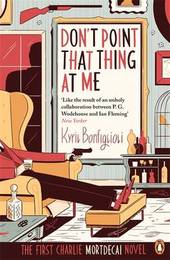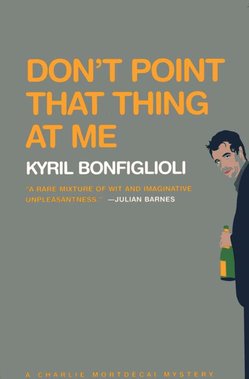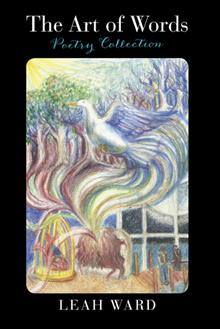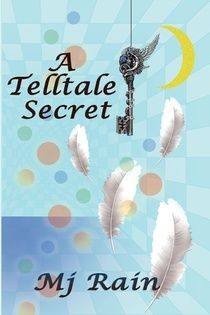
Today sees the release of the latest Johnny Depp vehicle (without Tim Burton’s involvement!), Mortdecai. But before rushing out to see this comedy crime caper, why not look into Mortdecai’s origins in the excellently titled Don’t Point That Thing At Me by Kyril Bonfiglioli, which first brought the dishonourable Charlie Mortdecai to the world.
 Click for Source Image
Click for Source Image Don’t Point That Thing At Me is the first in a series of Charlie Mortdecai novels, which the frankly gorgeous cover boasts as a cross between PG Wodehouse and Ian Fleming. Sometimes these “X meets Y” descriptions are detrimental and an obvious ploy to sell the book, but this time they’re right on the money. This adventure reads exactly as if Bertie Wooster had become a spy, and Bonfiglioli acknowledges that by repeatedly referring to the bumbling Wooster throughout the narrative. Bonfiglioli writes by the mantra that if you’re going to take obvious influence from another writer, you may as well go all out with it rather than try to deny the homage.
The problem with this is, while Bonfiglioli certainly can write, he is not PG Wodehouse. His characters do not possess the same levels of charm and wit that made Jeeves and Wooster so beloved, nor is his obvious comic potential as well realised. Often things get muddled: Bonfiglioli gets so lost in aping Wodehouse’s style that he seems to lose the uniqueness of his own characters, or is too busy trying to construct a perfectly witty narrative voice that the central plot of the art theft is often lost. There are nice repeated moments, such as almost every chapter ending with Mortdecai falling asleep in various different situations, but these still do not serve to elevate a bumbling middle section. All the elements, when looked at separately, work well, but make for a less enjoyable read when combined.
One of the book’s biggest successes, however, is in the unfortunately named character of Jock Strapp, the thuggish manservant of Charlie Mortdecai. As a sort of anti-Jeeves, Jock attends to his master heavy-handedly (sometimes literally) and has no issue with resorting to violence at the slightest provocation. In fact, it is often Jock’s behaviour that ups the stakes within the crime plot, and is the catalyst for the most thrilling aspects of the story.
Don’t Point That Thing At Me will probably make a very good film in Mortdecai, unless the filmmakers get things very wrong. Away from the often confusing, overly verbose narrative, both the comedy and the crime have the potential to be fully realised visually, and there is certainly a lot to draw from the story despite its short length.
Ultimately, Don’t Point That Thing At Me is pure entertainment. It is a short length, unafraid to wear its influences on its sleeve, and is as unapologetic as its main character. If there are elements you don’t like, or if you get confused, this book does not care, it just continues cracking its jokes and gets on with things. You can pull a lot of enjoyment from Don’t Point That Thing At Me, if you’re willing to sift through an increasingly muddled narrative to find them.





 RSS Feed
RSS Feed
